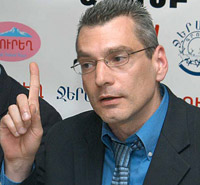After a divisive and violent postelection crisis, recently installed Armenian President Serzh Sarkisian is anxious to form a new cabinet capable of defusing tension and reaching out to a polarized population.
The scripted and predetermined transfer of power from outgoing President Robert Kocharian to his prime minister, Sarkisian, proved far more difficult and challenging than initially expected. But it was neither the political campaign, nor even the election itself, that has posed the most significant challenge to the new Armenian president, but the "crisis of confidence" that has emerged in the wake of the government’s response to the postelection crisis.
That crisis began with a series of demonstrations and protests by opposition supporters that culminated in a deadly March 1 clash between riot police and demonstrators. In response to the violence, which left eight demonstrators and two policemen dead, Kocharian imposed a 20-day state of emergency that outlawed public rallies and imposed restrictions on the media.
By the end of the state of emergency, it became clear that the crisis was far from over, with the authorities’ subsequent crackdown on the opposition only fueling tension and fostering discontent. Against this backdrop, Sarkisian’s April 9 inauguration was marred by a crisis of confidence. This was also confirmed by the decision to stage a large military parade in the Armenian capital timed to coincide with the inauguration, a move aimed more at protection and intimidation than celebration.
Throughout his tenure as defense minister and prime minister, and even before that, President Sarkisian has been widely regarded as a chess enthusiast. His passion for chess is also seen as explaining his obsession for tactics and strategy, and he is now applying the very same tactics and strategy to a new political chessboard.
Sarkisian is now seeking to consolidate and stabilize his power base. The first step toward this goal is the formation of a cabinet. But even this first step is fraught with challenge and difficulty, stemming from deep-seated and pronounced public skepticism. For this reason, Sarkisian sought to reassure and reach out by bringing in the nonpartisan Central Bank chairman, Tigran Sarkisian (no relation), as prime minister. That choice was intended to reassure the public by selecting a technocrat as prime minister, in a tactical move toward more neutral politics. Similarly, the elevation of General Seyran Ohanian from military chief of staff to defense minister was regarded as a prudent promotion for a professional and prominent military figure generally respected and viewed as largely above partisan politics.
The political benefits from these first appointments have been somewhat dissipated by the president’s more questionable third appointment, however.
Although the dismissal of long-serving Foreign Minister Vartan Oskanian was widely expected, his replacement by Ambassador to France Eduard Nalbandian was rather surprising. Regarded as a "professional diplomat," Nalbandian gained prominence more from his ties to the Russian political elite and his personal connections with Russia (he is rumored to hold Russian citizenship) than from any significant diplomatic experience or achievements.
The significance of replacing the diasporan Armenian Oskanian with the more Russian-centric Nalbandian seems to be rooted in Sarkisian’s need to reassure Armenia’s patrons in Moscow, after Russian concerns over the recent political crisis and perhaps to balance efforts Sarkisian has made over the past 18 months to improve his image in the West.
The real challenge to Sarkisian at this stage comes not from the opposition, however, but from the power of his predecessor. Bolstered by his still-potent hold over the parliament and the vulnerability of the newly forged four-party ruling coalition, Kocharian seems intent on exercising his leverage over Sarkisian in the next round of ministerial appointments.
Specifically, Kocharian is now seeking to protect and promote two of his most loyal and trusted political allies. He wants to further the political career of his long-time ally, outgoing Minister for Territorial Administration and Deputy Prime Minister Hovik Abrahamian, by imposing him on Sarkisian as his next chief of staff. At the same time, Kocharian is also attempting to protect his own former chief of staff, the young and widely disliked Armen Gevorgian, by forcing Sarkisian to name him as deputy prime minister.
Kocharian’s plans may be successful, mainly due to the combination of Sarkisian’s crisis-induced weakness and Kocharian’s own influence over a significant number of parliament deputies, including those from Prosperous Armenia (the second-largest bloc), the Armenian Revolutionary Federation-Dashnakstutiun (HHD), and even a large number of deputies from the dominant Republican Party (HHK), the largest party. The HHK has been nominally led by Sarkisian since the death of former Prime Minister Andranik Markarian in March 2007, but is not 100 percent loyal to him.
While this challenge from Kocharian is now potent and will influence Sarkisian’s ability to select the ministers of his choice, Kocharian’s power over the new president is both limited and fleeting. Given that Kocharian lacks a real power base of his own and now has no official position, those still loyal to him are likely to gravitate sooner or later into Sarkisian’s orbit. But for the moment, the two men remain natural rivals.

